|
|
|
Sort Order |
|
|
|
Items / Page
|
|
|
|
|
|
|
| Srl | Item |
| 1 |
ID:
171454
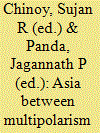

|
|
|
|
|
| Publication |
New Delhi, KW Publishers Pvt Ltd, 2020.
|
| Description |
lii, 587p.: tables, figures, mapshbk
|
| Standard Number |
9789389137439
|
|
|
|
|
|
|
|
|
|
|
|
Copies: C:2/I:0,R:0,Q:0
Circulation
| Accession# | Call# | Current Location | Status | Policy | Location |
| 059863 | 327.5/CHI 059863 | Main | On Shelf | General | |
| 059864 | 327.5/CHI 059864 | Main | On Shelf | General | |
|
|
|
|
| 2 |
ID:
151030
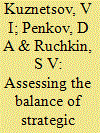

|
|
|
|
|
| Summary/Abstract |
The paper elucidates basic theoretical points of the functional approach to estimate the correlation between strategic forces of sides in a multipolar world, and specifies the theoretical base of this functional approach with a view to further using the latter in the interests of addressing a broader range of applied problems. It reviews categories of strategic forces balance in coalitions, formulates the concept of the extent of unacceptable damage for opposing coalitions, and substantiates the potential of using the functional approach to tackle direct and inverse problems related to the assessment of strategic forces in coalitions.
|
|
|
|
|
|
|
|
|
|
|
|
|
|
|
|
| 3 |
ID:
170685
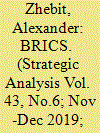

|
|
|
|
|
| Summary/Abstract |
Having overcome its ‘middle-power’ complex during the centre-left governments, Brazil obtained a relatively robust position in international politics as global power, siding with G-20, BRICS and other multilateral bodies. However, since the 2018 presidential elections Brazil has been undergoing a visible shift in its foreign policy towards more alignment with the US and the West that questions its traditional international autonomy, multilateralism, South-South engagement and environmental activism. This shift may consequently affect not only its positioning within the BRICS and governance alike, but also cause a slide into a conservative complacency with a hegemonic vision of the multipolar world.
|
|
|
|
|
|
|
|
|
|
|
|
|
|
|
|
| 4 |
ID:
053641
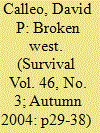

|
|
|
|
|
| Publication |
2004.
|
| Description |
p29-38
|
| Summary/Abstract |
Deep political fissures have opened in the West. Contending visions of the future have arisen on each side of the Atlantic. America, driven by its outsize military and economic strength, has developed a unipolar, hegemonic vision of the future. Europe pursues its own self-sustaining union of nation states that points towards a pluralist world order that is multipolar, balanced and multilateral. The future of the West, and perhaps of the world, will depend on whether these two visions can accommodate each other sufficiently to establish a harmonious balance. However, without a more coherent and integrated Europe and a revival of American appreciation for constitutional balance, America's imperial fantasies and Europe's constitutional dreams may well defeat each other.
|
|
|
|
|
|
|
|
|
|
|
|
|
|
|
|
| 5 |
ID:
084600
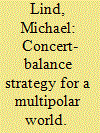

|
|
|
| 6 |
ID:
133612
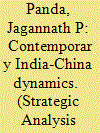

|
|
|
|
|
| Publication |
2014.
|
| Summary/Abstract |
This review essay examines the significance of India-China relations against the background of the current phenomenon of a multipolar world in the light of four recent publications on the subject. Tien-sze Fang's and Jeff M. Smith's works discuss the current facets of India-China relations, while William Antholis's and Carl J. Dahlman's works deal with the character and standing that India and China bring to their regional and global discourse. After reviewing the core of these books, this essay will seek to locate the dialogue and import of India-China relations in two constructive settings: first, the versatility of this relationship in a multipolar world order; second, why this relationship is important to the future of multipolar world politics. In the official idiom, India-China dynamics are not confined to the bilateral ambience. For example, a joint statement issued on the occasion of the visit of Premier Li Keqiang to India (May 20, 2013) records that 'There is enough space in the world for the development of India and China … As the two largest developing countries in the world, the relationship between India and China transcends bilateral scope and has acquired regional, global and strategic significance'.1 This official endorsement comes against the background that the year 2014 is the 60th anniversary of the occasion when the Panchasheel discourse was first enunciated.
|
|
|
|
|
|
|
|
|
|
|
|
|
|
|
|
| 7 |
ID:
149716
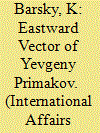

|
|
|
|
|
| Summary/Abstract |
IN RECENT YEARS, Russia's foreign policy has been swinging eastward, toward Asia-Pacific, with unprecedented rapidity and confidence. But nothing would be further from the truth than the idea that this is a reaction to the Western sanctions. It is a course based on sound principles and the understanding of the nature of the national interests of Russia as a Eurasian, Asia-Pacific, and, in broader terms, Euro-Pacific power. The basis for this policy was laid by Yevgeny Primakov, who was the foreign minister of Russia from 1996 to 1998.
|
|
|
|
|
|
|
|
|
|
|
|
|
|
|
|
| 8 |
ID:
107432
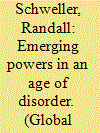

|
|
|
|
|
| Publication |
2011.
|
| Summary/Abstract |
THE DRAMATIC RISE OF CHINA AND INDIA AMONG OTHERS HAS SET THE STAGE
for a fundamental rethinking of world politics in an age of the waning dominance of US power as a force for remaking the world in its own image. While
Pax Americana is not yet teetering on the edge of collapse, the consensus opinion is that the relative decline of the United States is probably irreversible and
its unipolar moment will soon give way to something new. A “return to multipolarity” is one way of describing this shift. It tells us that several great powers will emerge to challenge US primacy. That is all. The more important
question is: What sort of global order will emerge on the other side of the transition from unipolarity to multipolarity? Will it be one of peace and plenty or
conflict and scarcity? On this issue, experts are divided into two camps, pessimists and optimists.
|
|
|
|
|
|
|
|
|
|
|
|
|
|
|
|
| 9 |
ID:
089442
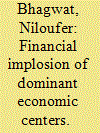

|
|
|
| 10 |
ID:
123530
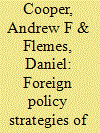

|
|
|
|
|
| Publication |
2013.
|
| Summary/Abstract |
This Introductory Review examines the major debates concerning the rise of emerging powers in the global system. It points to the fundamental difference between the contours of ascendancy in the first quarter of the twenty-first century from previous historical eras with reference to the number of countries placed in this category, the privileging of economic dimensions of power, and the much more elaborate and open levels with regard to institutionalization. Ample attention is paid to the BRICS, but consistent with the image of multipolarity, it also gives some emphasis to the question of whether the changing global system provides enhanced space for middle powers. After highlighting these highly relevant contextual considerations, the core of the Review moves to an analysis centred on more specific puzzles about the foreign policy strategies of emerging powers. One major puzzle is whether the preference of rising states is to work through established institutions or to utilize parallel and/or competitive mechanisms. Another concerns the balance between material interests, status-enhancement, and identity issues as motivators for policy preferences. Still another focuses on the degree to which China should be differentiated from the other BRICS, or indeed whether the BRICS share values such as a common politics of resentment or want to differentiate themselves on a normative-oriented basis in alterative groupings such as IBSA. A more sophisticated awareness of the limitations as well as of the capacities of the BRICS - with an appreciation of the intricate mix of concerns about solidarity and sovereignty, as well as conceptual tensions between realism and complex interdependence - is not only important for assessing the future trajectory of the BRICS role in the world, but in locating space for categories of countries such as middle powers. The major puzzle for middle powers is whether or not they will be able to mobilize attributes, notably the leveraging of 'network power', that provide them with comparative advantage. Although in overall terms the global system has not progressed towards multipolarity in a linear fashion underwritten by alternative actors, it is precisely due to this imprecision - and level of academic and operational contestation - that the articles assembled in this Special Issue have such salience.
|
|
|
|
|
|
|
|
|
|
|
|
|
|
|
|
| 11 |
ID:
103257
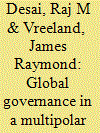

|
|
|
|
|
| Publication |
2011.
|
| Summary/Abstract |
The reform of global financial governance is long overdue. Recent changes to the governance of the International Monetary Fund partially address the lack of representation of emerging market countries, but not their loss of confidence in the institution. In the meantime, alternative and perhaps better approaches to the problems of open economics are being proposed at a regional level. We describe these regional monetary funds and discuss their prospects. We conclude that because economic interdependence is strongest at the regional level, regional cooperation seems well-suited to a multipolar world.
|
|
|
|
|
|
|
|
|
|
|
|
|
|
|
|
| 12 |
ID:
125012
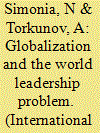

|
|
|
|
|
| Publication |
2013.
|
| Summary/Abstract |
THE BIPOLAR SYSTEM of international relations tumbled down unexpectedly leaving behind at least two consequential factors which for a long time remained ignored and/or deliberately pushed aside by many international players. First, the world no longer needed any state with a status of superpower, a product of ideological confrontation of two systems (two camps, in the Cold War parlance). Second, the trend toward a multipolar world (which had appeared and had been developing for some time behind the screen of bipolarity) became obvious. Still gaining strength (the process will take more than one decade to be completed) it ran into a wall of skepticism. For a long time, skeptics of all hues refused to recognize the obvious and piled one argument on another in an effort to disprove what they called the concept of multipolarity. Truth be said, this is not a concept - this is reality which explains why the American idea of unipolarity picked up by its supporters in other countries (Russia among them) promptly went out of fashion. Revived bipolarity came into vogue together with the global crisis and expectations that China's rapidly growing economy which responded to the world crisis by a slight drop of GDP (from 10% to 7.58%) and its rapidly mounting military might will make it one of the poles instead of the Soviet Union. There is a lot of talk about a "new type of capitalism" that challenges the Western capitalist countries and that outstrips them one after another. Having pushed Japan from its second place in world economy China is pushing forward toward America's first place. The larger part of expert community, including experts of the UN and other international organizations, is convinced that this is merely a matter of time. This is another myth with no serious or solid scientific foundation: superficial and formal comparison of statistics (GDP or even per capita GDP) which implies that the world is uniform cannot be taken for the starting point.
|
|
|
|
|
|
|
|
|
|
|
|
|
|
|
|
| 13 |
ID:
147474
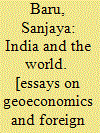

|
|
|
|
|
| Publication |
New Delhi, Academic Foundation, 2016.
|
| Description |
240p.Hbk
|
| Standard Number |
09789332703797
|
|
|
|
|
|
|
|
|
|
|
|
Copies: C:1/I:0,R:0,Q:0
Circulation
| Accession# | Call# | Current Location | Status | Policy | Location |
| 058789 | 337.54/BAR 058789 | Main | On Shelf | General | |
|
|
|
|
| 14 |
ID:
173797
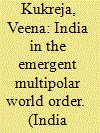

|
|
|
|
|
| Summary/Abstract |
India has a middle power status and a rising power mindset. The emerging multipolar world manifests opportunities as well as challenges to India’s foreign policy. The newness quotient is Prime Minister Narendra Modi’s ‘economy first’ approach rooted in his desire to create external conditions necessary to ensure domestic economic progress. He has displayed dynamism while engaging all major powers, promoting and reintegrating India with the global economy, promoting greater cooperation with South Asian neighbours and renewing strategic connections in the Indian Ocean, the Middle East, Central Asia and Africa. Pragmatism in India’s foreign policy is seen in Indo–US relations reaching a new level or in cooperation with China on climate change while opposing its territorial claims in the South China Sea and One Belt One Road Project. To counter China, India has sought close strategic partnerships with the USA and its allies and main partners in Asia-Pacific while retaining its strategic autonomy. A major challenge to India’s foreign policy is the downward spiral of relations with Pakistan.
|
|
|
|
|
|
|
|
|
|
|
|
|
|
|
|
| 15 |
ID:
125332
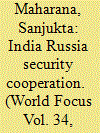

|
|
|
|
|
| Publication |
2013.
|
| Summary/Abstract |
Russia occupies an important place in the energy security of India and also has become an important arms supplier as well as joint producer of arms and armament, making itself an important partner of provider of security to India. The role of India and Russia in the process of peace building in Central Asia and Afghanistan would contribute to the establishment of a peaceful, democratic, secure, stable as well as multipolar world.
|
|
|
|
|
|
|
|
|
|
|
|
|
|
|
|
| 16 |
ID:
068696
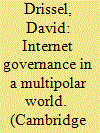

|
|
|
| 17 |
ID:
113182
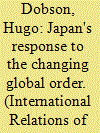

|
|
|
|
|
| Publication |
2012.
|
| Summary/Abstract |
Over recent years, media, academic, and policy-makers' attention has focused on changes in the global order from a unipolar to a multipolar world. The emergence of the Group of 20 (G20) since 2008 as the 'premier forum for international economic cooperation', which includes a number of developed and developing countries, and its 'eclipse' of the Group of 8 (G8) summit are acknowledged as some of the most salient symptoms of this shift. This article takes the intensive period of 'G' summitry between 2008 and 2011 as a pertinent case study to begin to explore the concrete responses of key protagonists to this reconfiguration of the architecture of global governance specifically and thereby the recent shift in the global order more broadly. In the specific case of Japan, widely assumed to be a declining power, the article highlights both consistency and change in the responses of and strategies employed by Japanese policy-makers within 'G' summitry. Various theoretical positions can account for this to differing degrees which also bring into relief the ultimately contradictory trajectory of Japan's response to the changing global order.
|
|
|
|
|
|
|
|
|
|
|
|
|
|
|
|
| 18 |
ID:
108526
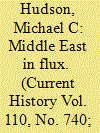

|
|
|
| 19 |
ID:
062485
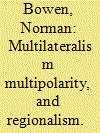

|
|
|
| 20 |
ID:
117418
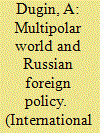

|
|
|
|
|
| Publication |
2012.
|
| Summary/Abstract |
Armen Oganesyan, Editor-in-Chief of International Affairs: On instructions from the president, the Foreign Ministry is to come up, in December 2012, with an updated version of Russia's foreign policy concept. From your viewpoint, which are our foreign policy priorities you would by all means include in this concept?
A. Dugin: I can say that I'm doing appropriate studies as head of the Sociology of International Relations Department at the Moscow State University. This past spring, my team brought in a theory of multipolar world. This is a rather voluminous study whose provisions, I think, should be reflected in the doctrine. It is impossible to create a consistent foreign policy doctrine without explaining what a multipolar structure of the world is, without explaining what we mean by a multipolar structure of the world and how to form it.
|
|
|
|
|
|
|
|
|
|
|
|
|
|
|
|
|
|
|
|
|